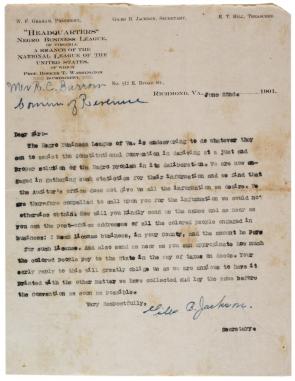Disfranchisement of African American voters in Virginia, 1901
A Spotlight on a Primary Source by Giles Jackson
 In February 1901, the Virginia General Assembly authorized a constitutional convention to draft election reforms. The convention, supported vehemently by Democrats, aimed to disfranchise African Americans without violating the Fourteenth and Fifteenth Amendments of the US Constitution. The delegates to the convention considered poll taxes and literacy tests as requirements for voting, and African American organizations were alarmed by the implications of the proposed changes to the state constitution.
In February 1901, the Virginia General Assembly authorized a constitutional convention to draft election reforms. The convention, supported vehemently by Democrats, aimed to disfranchise African Americans without violating the Fourteenth and Fifteenth Amendments of the US Constitution. The delegates to the convention considered poll taxes and literacy tests as requirements for voting, and African American organizations were alarmed by the implications of the proposed changes to the state constitution.
In June 1901, Giles Jackson of Virginia’s Negro Business League wrote to the Commissioner of Revenue of Virginia to ask for information on black businessmen in Virginia. "The Negro Business League of Va. is endeavoring to do whatever they can to assist the constitutional convention in deriving at a just and proper solution," Jackson wrote. He asked for "the names and as near as you can the post-office addresses of all the colored people engaged in business . . . [a]nd . . . how much the colored people pay to the state in the way of taxes on deeds." The organization hoped to determine which African Americans would be qualified to vote under the proposed constitution and to appeal to the convention not to limit black suffrage.
The convention passed a new constitution in 1902 that required voters to pay a poll tax or pass a literacy text. It successfully disfranchised large numbers of African Americans, as well as some poor white residents.
A full transcript is available.
Transcript
Dear Sir:-
The Negro Business League of Va. is endeavoring to do whatever they can to assist the constitutional convention in deriving at a just and proper solution of the Negro problem in its deliberation. We are now engaged in gathering such statistics for their information and we find that the Auditor’s office does not give us all the information we desire. We are therefore compelled to call upon you for the information we could not otherwise obtain. Now will you kindly send us the names and as near as you can the post-office addresses of all the colored people engaged in business; I mean license business, in your county, and the amount he pays for such license. And also send as near as you can approximate how much the colored people pay to the state in the way of taxes on deeds. Your early reply to this will greatly oblige us as we are anxious to have it printed with the other matter we have collected and lay the same before the convention as soon as possible.
Very Respectfully,
Giles B. Jackson.
Secretary.
